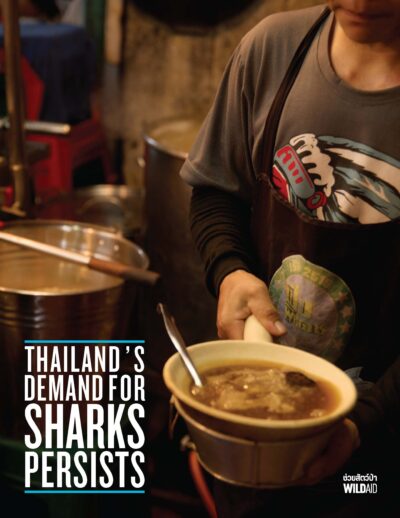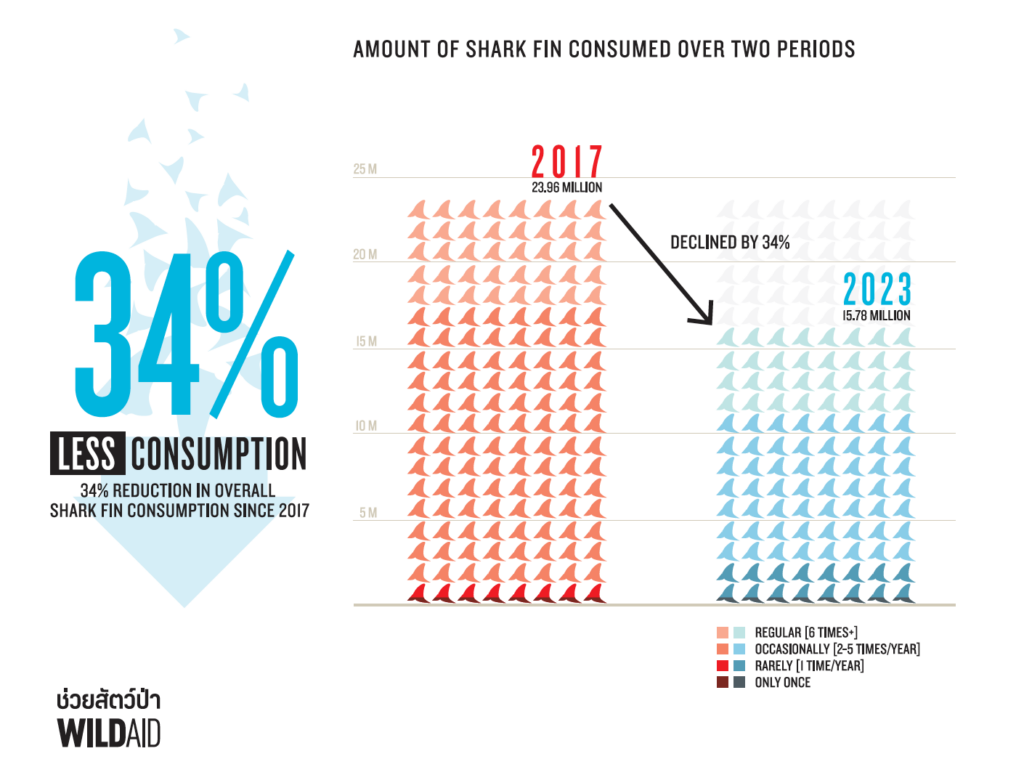
Thailand’s shark fin consumption has declined by 34% over the past six years, equivalent to an estimated 8.1 million fewer servings of shark fin per year, according to the new report released by WildAid on Shark Awareness Day. However, more than half (56%) of urban Thais still want to try shark fin, indicating that the country remains an active market for shark fin consumption.
The 2023 survey, independently conducted by Rapid Asia, sought to understand and assess changes in consumption behavior, attitudes, and knowledge towards sharks since the first survey, conducted in 2017. The online survey collected data from 1,007 urban Thais aged 25 years or older in Thailand’s central, northeast, north, and south regions.
21% of urban Thai respondents had consumed shark fin in the past 12 months. Compared to the 29% in 2017, this represents a decrease of 28%. Based on Thailand’s urban population statistics, it’s estimated that the number of shark fin consumers has dropped from around 6.6 million to around 5.3 million, despite a 2.7 million increase of the urban population in this age segment during the time period, indicating a decreased consumption of shark fin amongst urban citizens.
The frequency of consumption has also declined: WildAid estimates that the number of times shark fin was consumed has declined from 23.9 million times or servings per year in 2017 to about 15.7 million times in 2023, representing a 34% decrease, amounting to about 8.1 million fewer times shark fin was consumed.
The survey revealed a substantial 47% reduction among ‘occasional consumers’, or those who said they consumed shark fin 2-5 times per year, who shifted their consumption to one time per year or less.


Social gatherings remain the main consumption occasions for shark fin. Respondents from the latest survey reported they consume shark fin most often with family at restaurants (60%), followed by weddings (57%), and with friends at restaurants (46%), a finding consistent with that of 2017. However, home consumption increased in 2023, which is likely to be a result of the COVID-19 pandemic.
While the pandemic may have impacted consumption, as there were fewer weddings and social gatherings, the survey found evidence to suggest that campaign initiatives to reduce demand for shark fin such as WildAid’s ‘Chalong Mai Chalarm’ or ‘Celebrate with #NoSharkFin’ campaign are likely to have contributed to the reduction in demand seen between 2017 and 2023. Consumers of shark fin have become more aware of the negative consequences of shark fin consumption and are beginning to question what it means when tens of millions of sharks are killed for their fins and meat. The majority of respondents (88%), including consumers of shark fin, now understand that sharks are key to maintaining the balance of marine ecosystems, an increase from 68% in 2017.
The decline in shark fin consumption is consistent with key findings from a survey of Thai restaurant owners that offer shark fin soup, conducted independently by P.I.Y.A Research Co., Ltd. Vendors, reported that, overall, shark fin consumption is on the decline, especially among Generation Y and Z, perhaps as a result of the global and Thai economic slowdowns, younger generations becoming more environmentally conscious, and campaigns to reduce demand for shark fin.
The 2023 survey also assessed shark meat consumption trends, a product not previously explored. One in every three urban Thais plans to try shark meat in the future out of curiosity, a strong indication that the market could be growing. The potential local demand for shark meat is consistent with the recent study ‘Global shark fishing mortality still rising despite widespread regulatory change’ published earlier this year, which estimated global fishing mortality increased from 76 million sharks in 2012 to between 79-80 million between 2017-2019 as a result of increasing utilization of sharks and global demand for shark meat and non-fin products.


WildAid has launched multiple communications under the ‘Chalong Mai Chalarm’ / ‘Celebrate with #NoSharkFin’ campaign since 2018, enlisting popular celebrities to lend their voices for sharks, including actor ‘Pong’ Nawat Kulrattanarak and Miss Universe Thailand 2017 Maria Poonlertlarp, both of whom are passionate divers, activists, and WildAid ambassadors.
“I’m very thrilled to learn that the ‘Chalong Mai Chalarm’ campaign has played a significant role in reducing shark fin consumption, as I’ve been part of the campaign for the past six years. Thank you to everyone who demonstrates that weddings, special meals with family and friends, or business functions can be celebrated without shark fin. I strongly believe that the more people recognize sharks as an icon for marine conservation, the more effort will be made and necessary policies by relevant agencies will be strengthened to protect sharks and our oceans,” said Nawat Kulrattanarak.
Maria Poonlertlarp added, “I was so lucky to come across 2 whale sharks during my last dive and have experienced a couple of Black Tip sharks here in Thailand before. It’s amazing to see these beautiful creatures in their habitat doing what they do, and not interested in us humans at all as many movies and some of our perceptions make it out to be. Sharks may seem distant to many of us, but their importance impacts us all. It lies not only in keeping our oceans balanced but our coral reefs healthy and beautiful. Coral reefs provide homes to many fish, the oxygen we breathe, and exploration spots amongst many other things. I’d like to urge us all to keep sharks off the menu, as well as ban all products that use sharks.”


© Sirachai Arunrugstichai / WildAid
Last year, WildAid revealed alarming findings from a comprehensive DNA analysis of shark fin products sold in Thailand that showed 62% of the fins sampled came from sharks considered to be at risk of extinction by the IUCN Red List. The study confirmed consumers could be eating endangered sharks in their soup and underscores the heavy reliance on international sources for fins traded in Thai markets.
“The decline in shark fin consumption aligns with the societal trend observed in recent years, which reflects that Thais are becoming more aware of the importance of sharks to the ocean. Ongoing efforts in reducing consumption is an approach that needs to be continued. Not only does the demand for shark fin persist, but sharks are becoming more commonly used in pet food and snacks as well. WildAid also aims to drive area-based conservation to protect critical habitats for sharks, work with researchers to recover populations of endangered shark species that are crucial to the country’s tourism industry and ecosystem health, support the government, and engage main stakeholders to work together towards protecting these key species,” noted Petch Manopawitr, Conservation Scientist and Advisor to WildAid.
WildAid urges relevant government agencies to prioritize implementation of the National Plan of Actions for Conservation and Management of Sharks, Thailand (NPOA-Sharks), including increasing effectiveness in fisheries management to limit and reduce bycatch of sharks, improving the traceability system of trade in sharks/shark products, protecting priority habitats, and fostering understanding and engagement of stakeholders to take part in protecting sharks. These priorities are imperative to the survival of vulnerable shark populations in Thailand and around the world.
###
NOTE TO EDITORS:
Download ‘Thailand’s Demand for Sharks Persists’ report
Additional Information:
- Globally, one-third of all shark and ray species are at risk of extinction as a result of overfishing and bycatch.
- Download WildAid’s “Endangered Sharks in Your Bowl: DNA-based species identification of shark fins traded in Thai markets’ report.
For media inquiries, please contact:
Sippavit Vanasusri, Program and Communications Manager, Thailand
sippavit@wildaid.org T: +66-86-606-5599
Nuthatai Chotechuang, Thailand Program Director
nuthatai@wildaid.org T: +66-81-818-9251
About WildAid
WildAid inspires change and empowers the world to protect wildlife and vital habitats from critical threats, including illegal wildlife trafficking, climate change, and illegal fishing. WildAid delivers impact at scale in two distinct ways: 1) creating innovative communications campaigns that inspire millions of people in China, South East Asia, Africa, and the U.S. to protect endangered wildlife and reduce climate impacts, and 2) strengthening effective ocean enforcement of priority marine areas including marine protected areas, coastal fisheries, coral reefs, and blue carbon habitats with government, NGO, and community partners in 16 countries around the globe.
Stay in touch and get the latest WildAid updates.
SIGN UP